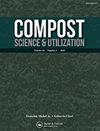堆肥特性对茄子大丽花黄萎病侵染进度的影响
IF 0.9
4区 农林科学
Q3 ECOLOGY
引用次数: 17
摘要
摘要测试了几种堆肥对大丽花黄萎病菌的抑制作用。(VCG B4、VD)在温室条件下对茄子(茄属)的施用。茄子植株通过将根浸入分生孢子悬浮液中进行接种,然后种植在装满堆肥或泥炭苔混合物的花盆中,并与珍珠岩混合。测试了六种堆肥和泥炭苔混合物,其中番茄垃圾堆肥抑制了大丽花,火鸡垃圾堆肥部分抑制了它。在番茄垃圾堆肥中种植的茄子木质部中,症状水平降低,真菌定植率降低,与其他培养基相比,这些植物积累了更多的干物质,叶绿素含量更高。然而,与其他培养基中的急剧下降相比,番茄垃圾堆肥中分生孢子的存活率仅略有下降,这表明不能将根除分生孢子作为抑制机制。2.5Mrad的番茄废弃物堆肥和泥炭的γ辐照使微生物密度降低了四个数量级,但番茄废弃物堆肥的γ辐照并没有降低其对大丽花的抑制作用。堆肥特性影响茄子幼苗木质部组织VD的发生率。这些特性可以表明影响该过程的生物和非生物因素。本文章由计算机程序翻译,如有差异,请以英文原文为准。
Effect of Compost Properties on Progress Rate of Verticillium dahliae Attack on Eggplant (Solanum melongena L.)
ABSTRACT Several composts were tested for their capacity to moderate the effect of Verticillium dahliae Kleb. (VCG B4, VD) on eggplant (Solanum melongena) under greenhouse conditions. Eggplants plantlets were inoculated by immersing their roots in conidial suspension and then planted in pots filled with mixtures of compost or peat moss, mixed with perlite. Six composts and peat moss mixtures were tested, of which tomato waste compost suppressed V. dahliae, and turkey litter compost partially suppressed it. Reduced levels of symptoms and lower fungal colonization were detected in the xylem of eggplants planted in tomato waste compost, and these plants accumulated more dry matter and had higher chlorophyll content compared to other media. However, survival of conidia in tomato waste compost showed only a moderate decrease compared with a sharp decrease in other media, suggesting that conidial eradication cannot be proposed as the suppressiveness mechanism. γ irradiation of tomato waste compost and peat at 2.5 Mrad reduced microorganism density by four orders of magnitude, but irradiation of tomato waste compost did not reduce its suppressiveness of V. dahliae. Composts properties affected progress rate of VD in the xylem tissue of eggplant seedling. These properties could indicate both biotic and abiotic factors affecting the process.
求助全文
通过发布文献求助,成功后即可免费获取论文全文。
去求助
来源期刊

Compost Science & Utilization
农林科学-生态学
CiteScore
4.10
自引率
0.00%
发文量
0
审稿时长
>36 weeks
期刊介绍:
4 issues per year
Compost Science & Utilization is currently abstracted/indexed in: CABI Agriculture & Environment Abstracts, CSA Biotechnology and Environmental Engineering Abstracts, EBSCOhost Abstracts, Elsevier Compendex and GEOBASE Abstracts, PubMed, ProQuest Science Abstracts, and Thomson Reuters Biological Abstracts and Science Citation Index
 求助内容:
求助内容: 应助结果提醒方式:
应助结果提醒方式:


